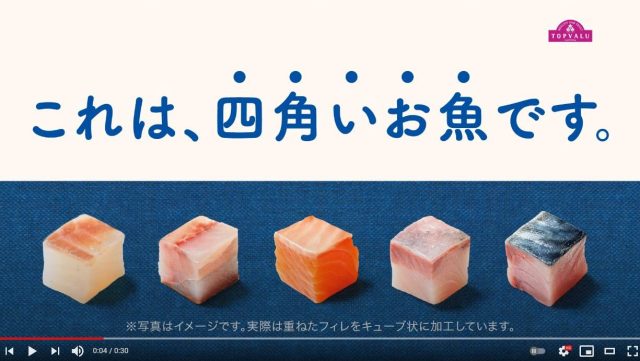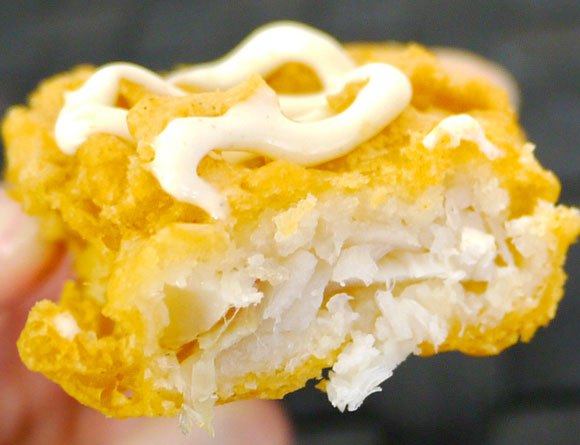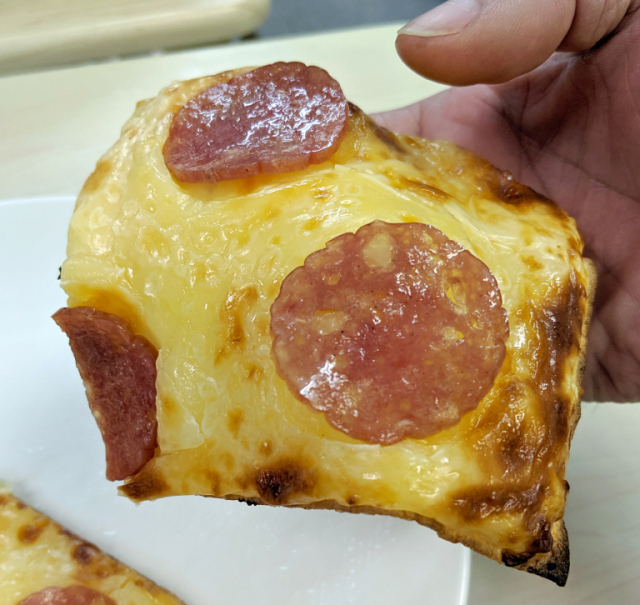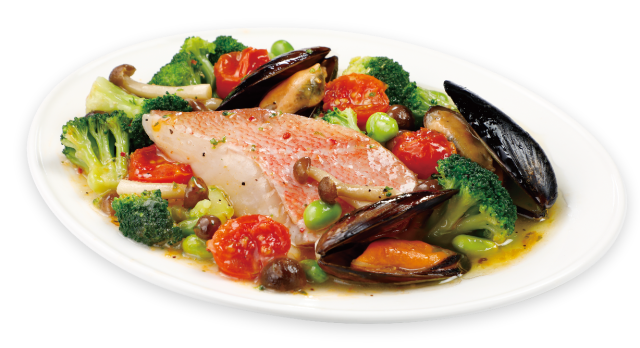
Everything tastes better when it’s a cube!
It’s certainly no secret that Japan is a country that loves to eat fish and in a variety of ways from sushi to soups to a nice grilled filet. But it might surprise some to learn that by and large people here don’t really go for the taste of the humble fish stick or “fish finger” if you will.
Heavily processed and battered white fish meat does exist in Japan, mainly as a cheap bento side dish and in the Filet-O-Fish at McDonald’s. That’s about the limit that it’s tolerated though, with supermarket freezer sections only offering a smattering of frozen processed fish meat.
▼ KFC also flirted with Kentucky Fried Fish, but it never stuck around

It’s not terribly clear why this is. Some might say it’s a general awareness of food quality that causes people in Japan to stay away from conglomerated meats from unclear origins. However, chicken nuggets are everywhere despite being made in a very similar manner, so people here clearly aren’t that averse to highly processed foods.
▼ Heck, we even found fish meat that had been processed into a pepperoni pizza, now that’s processing!

More likely it’s just a conception of what fish “should” be in the minds of Japanese diners. To draw comparisons, it might be like how a lover of pork ribs might flinch at the concept of Spam. Or more universally, fish sticks to Japanese people might be seen the same way that anyone would view eating processed broccoli sticks coated in bread. That probably wouldn’t taste so bad, but most people’s initial reaction to it would probably be to ask; “Why even bother doing this?”
▼ The Japanese standard for fish served with the global standard for broccoli
However, eating unprocessed fish has its drawbacks. It’s full of bones that are a nuisance at best and dangerous at worst. It can be time consuming and messy to cook and leave a less-than-pleasant smelling amount of waste when finished.
According to major retailer Aeon, who also runs a number of supermarket chains, these issues, combined with a drastic increase in home cooking due to COVID-19, have led to an increased demand for a simpler way to cook fish. These are the perfect conditions for fish sticks to finally dominate in Japan, right?
Wrong!
Aeon instead went to great lengths to develop fish meat that was both minimally processed but easy to cook and eat. The fruits of this labor is Papatto Dekiru Osakana Okazu (“Fish Side Dish In a Jiffy”) which is sold under Aeon’s Top Valu store brand and available in five types of fish: Pacific cod, horse mackerel, salmon, yellowtail, and chub mackerel.
Despite their very inorganic shape, this meat undergoes the bare minimum of processing, if you would even call it “processing.” In a nutshell, the bones are removed from the fish filets which are then stacked into a layered sheet and pressed together while freezing, with no binding agent used at all.
These frozen sheets of fish are then cut up into cubes, dusted with flour and packaged. It’s all much easier said than done, because getting the different cuts of fish to merge as one and stay that way throughout thawing and cooking took a lot of trial and error. In the end though, Aeon says that this method ended up using more of the fish’s meat and ultimately reduced waste, because even the thinner meat near the tail of the fish was usable this way.
The result is a boneless bite-size cut of fish that only needs to be plopped into a frying pan to cook. Aeon is hoping that this simplicity will encourage home cooks to experiment more with dishes using fish such as pastas and salads.
These fish cubes have only hit seafood sections on 12 May for about 358 yen (US$3.26) a pack, so it remains to be seen if they’ll catch on. If the day ever comes that we see skilfish or warasubo sold in cubes, it’ll probably be safe to say that it was a success.
Source: Top Value, FNN Prime Online, PR Times
Top image: YouTube/トップバリュ公式チャンネル【TOPVALU】
Insert images: PR Times (Unless otherwise stated)
● Want to hear about SoraNews24’s latest articles as soon as they’re published? Follow us on Facebook and Twitter!




 Starbucks Japan unveils new sakura cherry blossom collection for hanami season 2026
Starbucks Japan unveils new sakura cherry blossom collection for hanami season 2026 Is Tokyo Station’s startlingly expensive wagyu bento boxed lunch worth its high price?[Taste test]
Is Tokyo Station’s startlingly expensive wagyu bento boxed lunch worth its high price?[Taste test] Kyoto raises hotel accommodation tax to fight overtourism, travelers could pay up to 10 times more
Kyoto raises hotel accommodation tax to fight overtourism, travelers could pay up to 10 times more Sakura Festival in Chiyoda mixes illuminations, boats, music, and Rilakkuma in the heart of Tokyo
Sakura Festival in Chiyoda mixes illuminations, boats, music, and Rilakkuma in the heart of Tokyo Zelda isn’t the Nintendo anime adaptation Japanese fans want to see most, survey says
Zelda isn’t the Nintendo anime adaptation Japanese fans want to see most, survey says Starbucks Japan unveils new sakura cherry blossom collection for hanami season 2026
Starbucks Japan unveils new sakura cherry blossom collection for hanami season 2026 Is Tokyo Station’s startlingly expensive wagyu bento boxed lunch worth its high price?[Taste test]
Is Tokyo Station’s startlingly expensive wagyu bento boxed lunch worth its high price?[Taste test] Kyoto raises hotel accommodation tax to fight overtourism, travelers could pay up to 10 times more
Kyoto raises hotel accommodation tax to fight overtourism, travelers could pay up to 10 times more Sakura Festival in Chiyoda mixes illuminations, boats, music, and Rilakkuma in the heart of Tokyo
Sakura Festival in Chiyoda mixes illuminations, boats, music, and Rilakkuma in the heart of Tokyo Zelda isn’t the Nintendo anime adaptation Japanese fans want to see most, survey says
Zelda isn’t the Nintendo anime adaptation Japanese fans want to see most, survey says Viral Japanese cheesecake from Osaka has a lesser known rival called Aunt Wanda
Viral Japanese cheesecake from Osaka has a lesser known rival called Aunt Wanda The top 5 ice creams you should try at Family Mart convenience stores in Japan this summer
The top 5 ice creams you should try at Family Mart convenience stores in Japan this summer We found a popular Japanese ramen chain in South Korea!…or so we thought
We found a popular Japanese ramen chain in South Korea!…or so we thought Japan’s new frozen sushi DIY kit – Great foodie fun, or cold-hearted abomination?【Taste test】
Japan’s new frozen sushi DIY kit – Great foodie fun, or cold-hearted abomination?【Taste test】 The best Hobonichi diaries, covers and stationery for 2026
The best Hobonichi diaries, covers and stationery for 2026 Starbucks Japan releases first-ever Hinamatsuri Girls’ Day Frappuccino
Starbucks Japan releases first-ever Hinamatsuri Girls’ Day Frappuccino Japanese restaurant chain serves Dragon Ball donuts and Senzu Beans this spring
Japanese restaurant chain serves Dragon Ball donuts and Senzu Beans this spring Japan Extreme Budget Travel! A trip from Tokyo to Izumo for just 30,000 yen [Part 1]
Japan Extreme Budget Travel! A trip from Tokyo to Izumo for just 30,000 yen [Part 1] Highest Starbucks in Japan set to open this spring in the Tokyo sky
Highest Starbucks in Japan set to open this spring in the Tokyo sky Japan’s craziest burger chain takes menchi katsu to new extreme levels
Japan’s craziest burger chain takes menchi katsu to new extreme levels Japan Extreme Budget Travel! A trip from Tokyo to Izumo for just 30,000 yen [Part 2]
Japan Extreme Budget Travel! A trip from Tokyo to Izumo for just 30,000 yen [Part 2] Japan has only one airport named after a samurai, so let’s check out Kochi Ryoma【Photos】
Japan has only one airport named after a samurai, so let’s check out Kochi Ryoma【Photos】 Japanese drugstore sells onigiri at pre-stupid era prices, but how do they compare to 7-Eleven?
Japanese drugstore sells onigiri at pre-stupid era prices, but how do they compare to 7-Eleven? Which convenience store onigiri rice balls are the most popular? Survey reveals surprising results
Which convenience store onigiri rice balls are the most popular? Survey reveals surprising results Japan’s newest Shinkansen has no seats…or passengers [Video]
Japan’s newest Shinkansen has no seats…or passengers [Video] Starbucks Japan releases new sakura goods and drinkware for cherry blossom season 2026
Starbucks Japan releases new sakura goods and drinkware for cherry blossom season 2026 Foreigners accounting for over 80 percent of off-course skiers needing rescue in Japan’s Hokkaido
Foreigners accounting for over 80 percent of off-course skiers needing rescue in Japan’s Hokkaido Super-salty pizza sends six kids to the hospital in Japan, linguistics blamed
Super-salty pizza sends six kids to the hospital in Japan, linguistics blamed Starbucks Japan unveils new sakura Frappuccino for cherry blossom season 2026
Starbucks Japan unveils new sakura Frappuccino for cherry blossom season 2026 Foreign tourists in Japan will get free Shinkansen tickets to promote regional tourism
Foreign tourists in Japan will get free Shinkansen tickets to promote regional tourism The 10 most annoying things foreign tourists do on Japanese trains, according to locals
The 10 most annoying things foreign tourists do on Japanese trains, according to locals Take a trip to Japan’s Dododo Land, the most irritating place on Earth
Take a trip to Japan’s Dododo Land, the most irritating place on Earth Naruto and Converse team up for new line of shinobi sneakers[Photos]
Naruto and Converse team up for new line of shinobi sneakers[Photos] Is China’s don’t-go-to-Japan warning affecting the lines at a popular Tokyo gyukatsu restaurant?
Is China’s don’t-go-to-Japan warning affecting the lines at a popular Tokyo gyukatsu restaurant? Survey asks foreign tourists what bothered them in Japan, more than half gave same answer
Survey asks foreign tourists what bothered them in Japan, more than half gave same answer Japan’s human washing machines will go on sale to general public, demos to be held in Tokyo
Japan’s human washing machines will go on sale to general public, demos to be held in Tokyo Starbucks Japan releases new drinkware and goods for Valentine’s Day
Starbucks Japan releases new drinkware and goods for Valentine’s Day We deeply regret going into this tunnel on our walk in the mountains of Japan
We deeply regret going into this tunnel on our walk in the mountains of Japan Studio Ghibli releases Kodama forest spirits from Princess Mononoke to light up your home
Studio Ghibli releases Kodama forest spirits from Princess Mononoke to light up your home Major Japanese hotel chain says reservations via overseas booking sites may not be valid
Major Japanese hotel chain says reservations via overseas booking sites may not be valid Put sesame oil in your coffee? Japanese maker says it’s the best way to start your day【Taste test】
Put sesame oil in your coffee? Japanese maker says it’s the best way to start your day【Taste test】 No more using real katana for tourism activities, Japan’s National Police Agency says
No more using real katana for tourism activities, Japan’s National Police Agency says Viral Japanese cheesecake from Osaka has a lesser known rival called Aunt Wanda
Viral Japanese cheesecake from Osaka has a lesser known rival called Aunt Wanda The top 5 ice creams you should try at Family Mart convenience stores in Japan this summer
The top 5 ice creams you should try at Family Mart convenience stores in Japan this summer We found a popular Japanese ramen chain in South Korea!…or so we thought
We found a popular Japanese ramen chain in South Korea!…or so we thought Japan’s new frozen sushi DIY kit – Great foodie fun, or cold-hearted abomination?【Taste test】
Japan’s new frozen sushi DIY kit – Great foodie fun, or cold-hearted abomination?【Taste test】 The best Hobonichi diaries, covers and stationery for 2026
The best Hobonichi diaries, covers and stationery for 2026 Can we be just like Shohei Ohtani on a budget with a Hello Kitty cap?
Can we be just like Shohei Ohtani on a budget with a Hello Kitty cap? Japan Extreme Budget Travel! A trip from Tokyo to Izumo for just 30,000 yen [Part 2]
Japan Extreme Budget Travel! A trip from Tokyo to Izumo for just 30,000 yen [Part 2] Satisfy your sweet tooth with cheesecake and more all-you-can-eat sweets at Cheese Garden
Satisfy your sweet tooth with cheesecake and more all-you-can-eat sweets at Cheese Garden Saitama is home to the best strawberries in Japan that you’ve probably never even heard of
Saitama is home to the best strawberries in Japan that you’ve probably never even heard of Chance to play Tetris on a massive staircase in Kyoto Station coming in March
Chance to play Tetris on a massive staircase in Kyoto Station coming in March Our writer of Korean descent weighs in on using Korean names in Japan
Our writer of Korean descent weighs in on using Korean names in Japan Big dam Godzilla appears in Japan as power-washer art on side of 195-foot dam【Video】
Big dam Godzilla appears in Japan as power-washer art on side of 195-foot dam【Video】 Sakuramochi festival sweetens things up at Tokyo’s Seibu Ikebukuro this season
Sakuramochi festival sweetens things up at Tokyo’s Seibu Ikebukuro this season